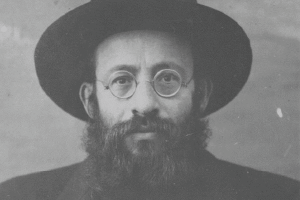My Father, My Mother, My Rebbi
| November 17, 2015Rav Michoel Ber Weissmandl is best known for his efforts to save Jews during the Holocaust, but his work after the war was no less heroic. From his yeshivah in Mount Kisco, Reb Michoel Ber served as a mentor and father figure to war orphans and Americans alike, raising them as if they were his own

In Adar/February of 1955, a small group of family members and yeshivah bochurim sat at a simple seudas bris in Mount Kisco, New York. The father of the boy stood up to speak. He was highly emotional, the joy and the sense of gratitude mixed with an intense longing, a sense of loss that could never fade. It was the bris of his fifth son born postwar. A powerful orator, the man wound down his intricate Torah thoughts with the following prayer for the new baby and his siblings: “Nekadeish es Shimcha ba’olam k’sheim shemakdishim oso bishmei marom” — may my five children sanctify Your Name in this world just as my five children whom the Nazis murdered are sanctifying It in the Heavens.”
The man was Rav Michoel Ber Weissmandl — broken by anguished suffering yet whole enough to establish not only a new family but an entire community. The churban was always before his eyes, yet he possessed enough strength to rebuild. Reb Michoel Ber is primarily known for his hatzalah work during the throes of war, but his postwar labors for Klal Yisrael were no less heroic. The yeshivah that flourished under his leadership still stands, and the talmidim he nurtured still revere him for the boundless energies he poured into them.
Rabbi Yaakov Spitzer of Boro Park, a close talmid of Rav Weissmandl, explains that his rebbi, who died 58 years ago this week, was on a mission to resurrect. “Reb Michoel Ber didn’t want a ‘Holocaust memorial.’ He wanted a live perpetuation. Not of how the parents died, but of how they lived and learned. He wanted to restore the glory of the Torah of Nitra, of the yeshivos, of the rabbanim, of the erliche balabatim. Today the young orphans he cared for have great-grandchildren, beautiful families, and sometimes expansive businesses, and all are erlich, thanks to his guidance.”
Early Years
Rav Weissmandl was born in Debrecen, Hungary, raised in Tyrnau, Slovakia, and studied in the yeshivos of Sered, Galanta, and Nitra. He was a Talmudic genius with a special interest in ancient manuscripts of Gemara, an interest that sent him on two visits to England to study in the library of Oxford University. His brilliance was already evident in the one-and-a-half-hour pilpul derashah that he prepared for his bar mitzvah. His grandfather asked him not to deliver such an impressive address at such a young age, and he acceded, but years later, when he delivered it to spellbound talmidim in the yeshivah, he offhandedly remarked that it had been prepared when he was a bochur of 12. He was a genius in mathematics and economics as well as Torah.
Reb Michoel Ber married the daughter of the Nitra Rav, Rav Shmuel Dovid Ungar ztz”l, and they had five children. When World War II broke out, his incisive mind realized the horrific extent of German plans for the Jews. His creativity and understanding of human nature, though, told him there was a way to at least delay the menace: the Nazis could be bribed. With supreme daring and ingenuity, he and a small “Working Group” managed to hold off the deportation of Slovakian Jews for almost two years, from 1942 till 1944. This created a window of opportunity through which thousands of Slovakians escaped. During that time he worked to save individuals and whole communities with every fiber of his being, communicated with the Nazi beasts themselves, the Allied powers, the Zionist groups, and international Jewish agencies.
Tragically, a lack of funds and apathy from overseas, along with assimilated Jews’ distrust of the “ultra-Orthodox,” conspired to thwart his plans. Nevertheless, thousands of Jews escaped certain murder through his help and advice. Eventually caught by the Nazis and placed on a train to Auschwitz, Reb Michoel Ber cut the lock of the cattle car with a saw hidden in a loaf of bread and jumped to safety, spending the rest of the war hidden in a bunker in Pressburg. The Nazis murdered his wife and five children.
Torah Heals
The bochurim who survived World War II came home to Nitra, Pressburg, or Sederhelm to find their families no more and everything destroyed. Rav Weissmandl gathered them and formed a group. “I knew your father, I’ll take care of you,” he would say. “Come with me and we’ll rebuild.” A few of the boys for whom he took responsibility were as young as 12 and 13; despite his brilliant mind and intense immersion in Torah, Reb Michoel Ber was able to reach them on their level and take care of every physical need, once staying on a Hungarian farm an entire week in order to persuade two young orphans to join his group.
Oops! We could not locate your form.












